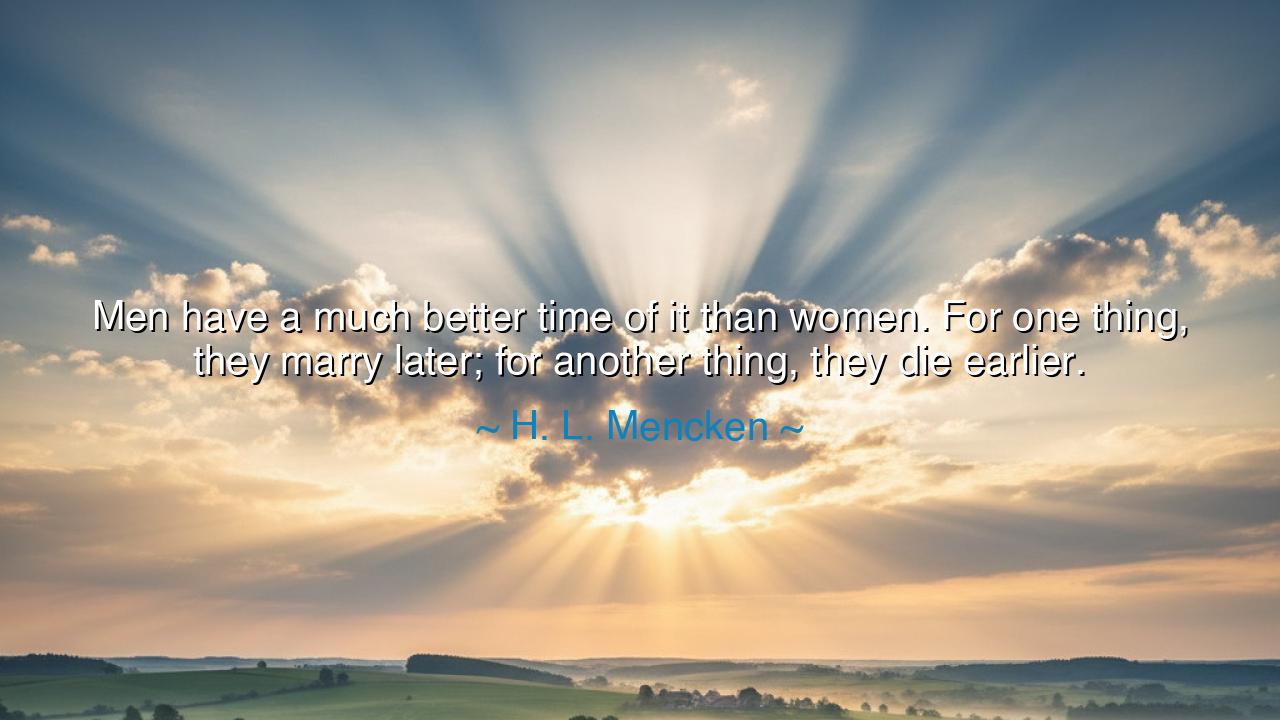
Men have a much better time of it than women. For one thing, they
Men have a much better time of it than women. For one thing, they marry later; for another thing, they die earlier.






“Men have a much better time of it than women. For one thing, they marry later; for another thing, they die earlier.” These words of H. L. Mencken, the American satirist and social critic, are wrapped in humor, yet they conceal a profound reflection on the imbalance between the lives of men and women. Beneath his wit lies the melancholy wisdom of a man observing how society’s structures, expectations, and burdens weigh differently upon the sexes. His jest is sharp, but not cruel; it is an ironic sigh at the expense of a world that pretends to be fair while quietly favoring one side. With this sentence, Mencken holds up a mirror to the human condition — and in that reflection, both laughter and truth are seen.
When Mencken says that men marry later, he speaks of freedom — the freedom to choose one’s path, to linger in youth, to explore ambition before settling into duty. Historically, men were granted the liberty of time, while women were bound by custom to marry young, as though their worth expired with their youth. For centuries, the fate of women was decided not by will, but by necessity; their lives were often measured by marriage, not by mastery of their own destiny. Mencken’s jest, then, conceals pity — pity for the women who, in his age and many before it, were hurried into lifelong service to others, while men delayed responsibility to savor the pleasures of independence.
The second half of his remark, that men die earlier, carries its own paradoxical truth. Though men’s freedom may seem enviable, it is also fleeting. The same world that allows men to live more freely often demands that they burn themselves out faster — in labor, in war, in pride. They are given privilege, yet burdened by expectation. Mencken, with his biting irony, suggests that perhaps early death is the final mercy granted to those who have enjoyed life’s advantages but must pay its inevitable cost. Women, meanwhile, live longer, often bearing the grief of loss and the quiet exhaustion of endurance. In this twisted symmetry of existence, neither gender truly “wins.” Both inherit the sorrow written into the fabric of human inequality.
This kind of irony — that laughter and pain coexist — was the hallmark of Mencken’s genius. He did not seek to praise men nor mock women, but to remind his readers that society’s arrangements are rarely just, and that even those who appear fortunate are ensnared by the same flawed order. His observation emerged from the early 20th century, a time when women were still fighting for the right to vote, to work, to be heard. Mencken’s humor was a way of exposing hypocrisy — showing that what was often presented as advantage for men was in truth a form of imbalance, a privilege shadowed by cost.
History is filled with examples that illuminate Mencken’s irony. Consider the life of Clara Barton, the founder of the American Red Cross. While men fought in wars and were celebrated for bravery, she fought a quieter battle — for compassion, for care, for dignity. Her work saved countless lives, yet she lived in an age that denied women equal recognition. The men she aided often perished young in glory; she endured long years in struggle, outliving many she had nursed. Mencken’s jest could have been whispered beside her: that the world grants men the short fire of recognition but women the long burden of resilience.
And yet, within this wry reflection lies an eternal lesson: that neither humor nor cynicism should blind us to the pursuit of balance. Mencken’s laughter is not an end, but a beginning — a spark that invites thought. The ancient sages taught that harmony between men and women is not a battle of advantage, but a covenant of respect. A society where one gender bears the weight while the other enjoys the wind cannot prosper for long. True equality is not achieved by reversing the scales, but by reshaping them — so that both may carry the human journey together, in dignity and understanding.
So, my children, hear the wisdom beneath the jest: freedom without fairness is hollow, and privilege without compassion is corruption. Do not envy the fleeting liberty of those who live faster or die sooner; seek instead the deeper freedom that comes from justice shared equally between all. Let men learn patience from women’s endurance, and women draw courage from men’s restlessness — and together, may they build a world where humor no longer hides truth, but celebrates harmony. For as Mencken reminds us through laughter’s veil, the struggle between man and woman is not a war to win, but a lesson to learn — a lesson that only equality can finally teach.






AAdministratorAdministrator
Welcome, honored guests. Please leave a comment, we will respond soon